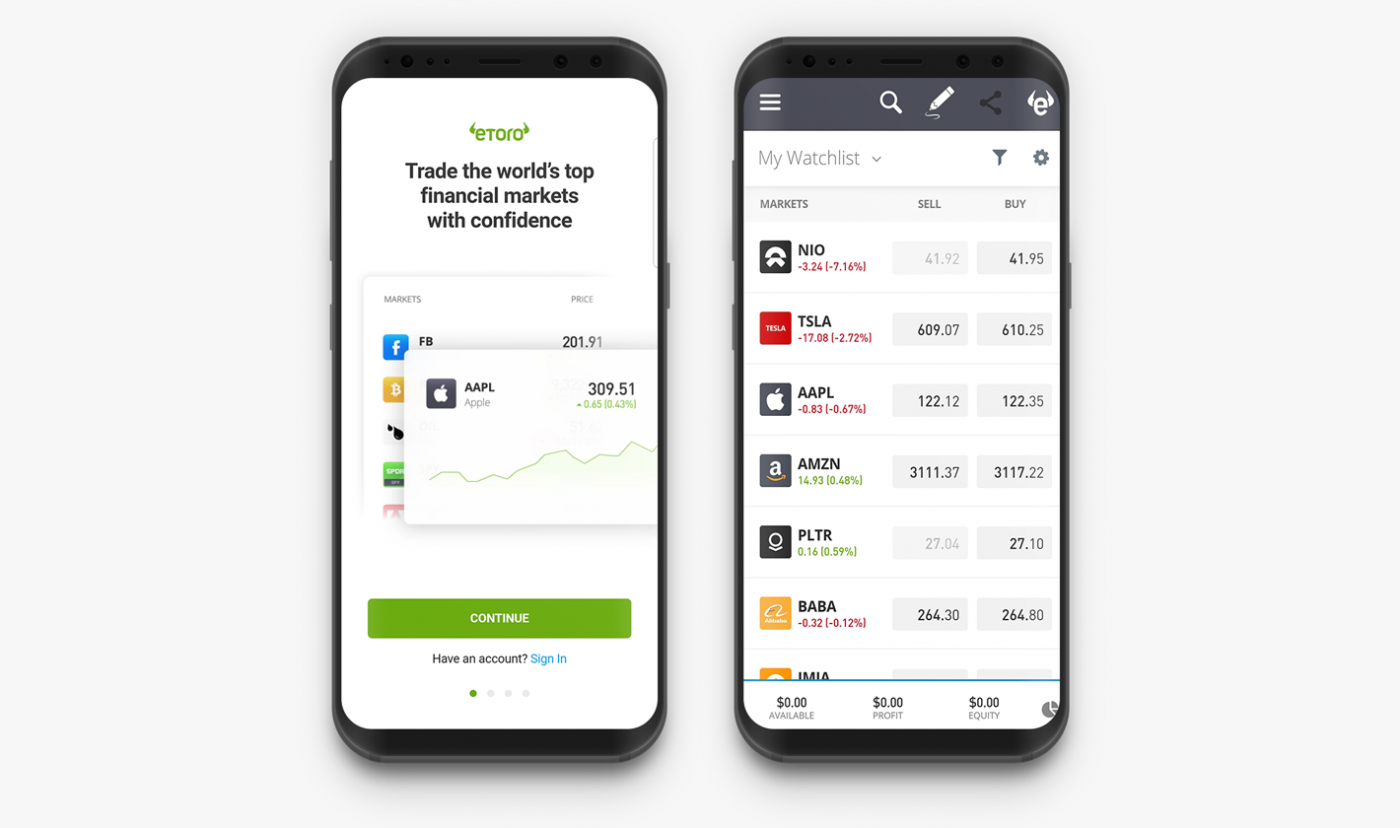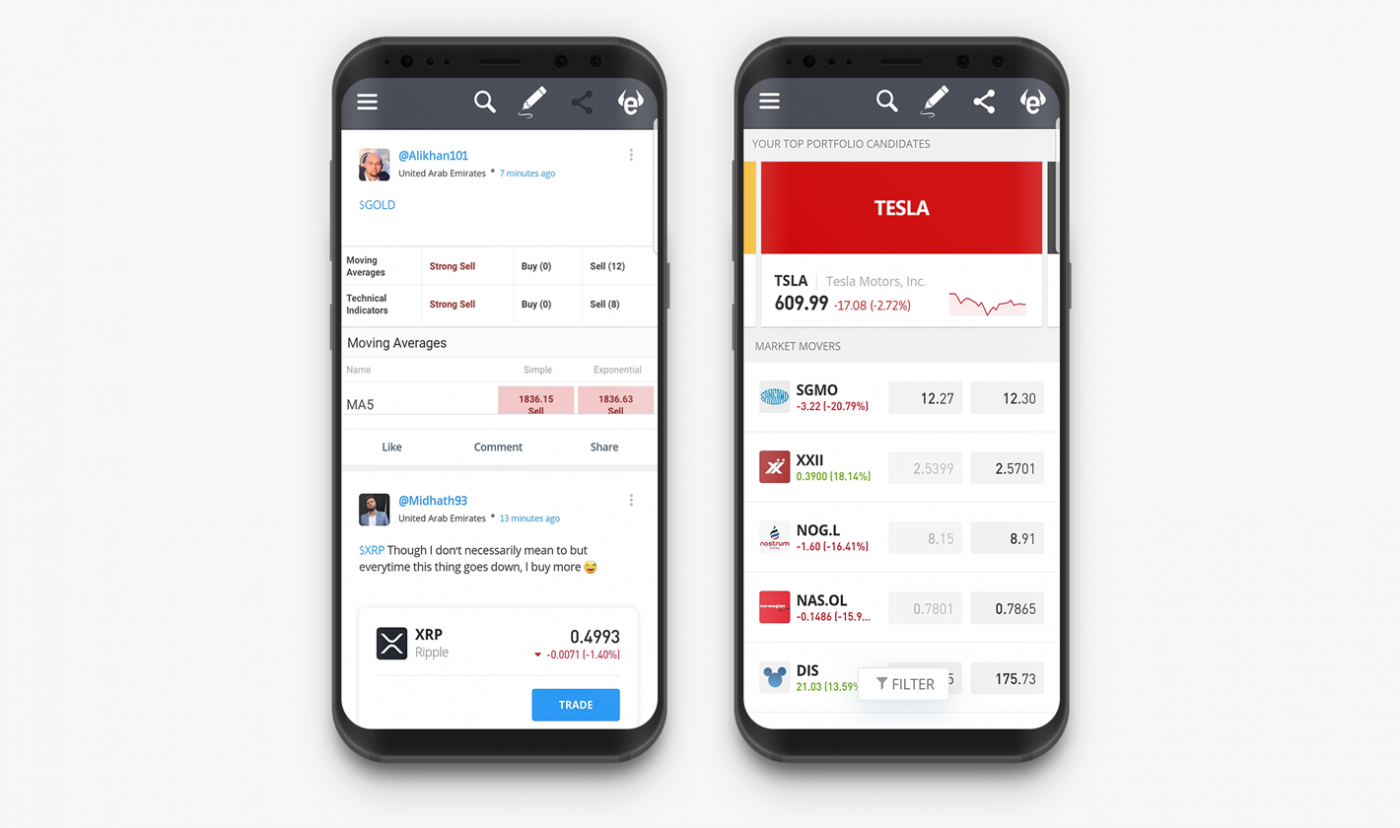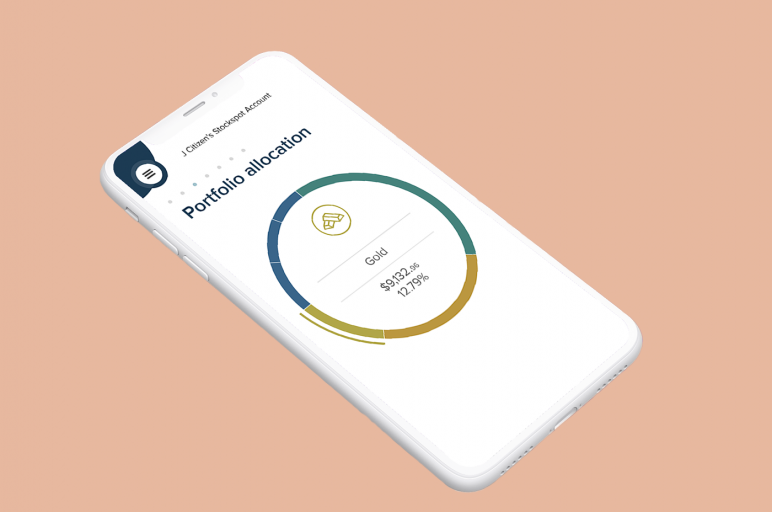What is eToro?
eToro is an Israeli founded online trading platform available in many countries around the world, including Australia. You can buy and sell shares like many other share trading apps, but the platform has some differentiating features.

The stand-out features of eToro are the multiple assets you can trade (shares, foreign currencies, cryptocurrencies, and commodities like gold and oil), and their CopyTrader and CopyPortfolio functions. The ‘copy’ functions allow users of the platform to imitate the strategies of more experienced investors.
‘Copied’ investors can join eToro’s Popular Investor program, which rewards investors for allowing their portfolio and trades to be copied.
eToro also has a News Feed, similar to feeds on social networks like Facebook or Twitter. The eToro newsfeed allows anyone on the platform to post opinions, updates, and suggestions so users can learn from each other.
eToro offers CFD trading. CFDs, or contracts for difference, are complex financial instruments and come with a high risk of losing money rapidly due to leverage. According to the eToro website, 51% of retail investor accounts lose money when trading CFDs with eToro.
The Australian regulator, has imposed a product intervention order imposing conditions on the issue and distribution of contracts for difference (CFDs) to retail clients. The order reduces the CFD leverage available to retail clients to between 30:1 and 2:1, depending on the underlying asset class. Before this order, a retail investor’s CFD exposure could be as much as 500 times their original outlay.
Is eToro free?
Initially opening up an account on eToro is free, although you will need to have a minimum first deposit for share trading of USD$50. After your first deposit, there is a minimum deposit amount of USD $50 and all deposits via bank transfer must be at least USD$500. Minimum trade sizes range depending on asset classes from $10 to $1,000, with further minimum limits to copy another trader ($200) or invest in a smart portfolio ($500).
eToro doesn’t charge any commissions or fees on opening an account or management, but they make their money through:
- Withdrawal fee (for withdrawals from a USD investment account to external accounts, eToro charges a fixed $5 fee. Minimum withdrawal amount: $30 from a USD account).
- Inactivity fee: for accounts with no logins in the previous 12 months $10/month
- Currency conversion: eToro only operates in USD and will charge currency conversion fees if you deposit AUD. As currency rates fluctuate so will your returns.
- Stock commission fees: for stock on an Australian Stock Exchange a $2 commission fee may apply when opening and closing a stock position.
- Buy/sell spread
- Stamp Duty Reserve Tax: A 0.5% regulatory transaction tax levied on the electronic purchase of all UK-listed stock.
- Cryptocurrency buy/sell fee (1%) and transfer fees (2%).
Check the eToro website for the most up to date information on their fees.

Is eToro trustworthy?
eToro is regulated by the Australia Securities and Investment Commission (ASIC) and holds an Australian Financial Services License (AFSL).
This means that the platform is regulated, but the asset classes on eToro can be risky in the hands of an inexperienced investor. Investors can buy and sell cryptocurrencies, forex and CFDs (contracts for difference), which are volatile investments.
Do I directly own my eToro investments?
The eToro trading platform is not an exchange or a market. This means that you can only buy and sell stocks within the eToro trading platform. It’s not possible to move open positions out of your eToro account to another broker or to another person.
When buying a stock or an ETF on eToro, you gain ownership, and the underlying asset is held in your name.
However, eToro doesn’t have CHESS sponsorship (being CHESS sponsored means the ASX is keeping a list of who owns what shares). This means that if eToro should ever collapse, your assets held are not held legally and beneficially in your name.
Additionally, if you buy a CFD you don’t have the same rights as owning assets like shares directly on a HIN at the exchange.
Find out why direct ownership of your investments is important.
How does eToro work?
For an Australian customer to open an active trading account with eToro, you will be required to make a minimum initial deposit of USD$50.
You’ll need to fill out a profile which will be public unless you mark it ‘private,’ and once you’ve deposited funds, you can start trading, either by picking shares or other assets yourself, or by copying the portfolio of a more experienced investor.
If you’re interested in share trading, you can currently buy (and hold) US listed stocks through eToro. These stocks are traded on the NASDAQ and NYSE markets alongside a range of other foreign exchanges.
You can also buy fractional shares on eToro. This means being able to purchase as little of 0.1% of a share from high-priced companies, such as Amazon or Facebook, providing this is above the investment minimum.
How do I withdraw my money?
Your initial withdrawal from eToro will require you to have a verified account (which means you’ll need government issued ID, as well as proof of your address). Once you have a verified account, you can withdraw your money at any time, but processing time may take a few business days.

Is eToro good for beginners?
eToro has positioned themselves as a social platform, and as such, those who are keen on trading regularly can learn from other investors. The platform offers various trading tools and courses, and every trader who signs up to eToro is given the opportunity to practice their strategies with a dummy account including $100,000 of virtual money.
The platform charges inactivity fees, so by inference does not encourage passive investment. Since active investment needs a lot of research and attention to the market movements, it might not be the easiest way to invest for a beginner.
Additionally, while you can purchase shares, the other assets available on the platform are the domain of more experienced investors (CFDs, forex, and cryptocurrencies).
eToro and Robinhood compared
Robinhood offers free trading in the U.S. but makes most of its money from selling order flow and receiving compensation for directing orders to different parties for executing a trade.
Robinhood also earns money from margin lending which means an investor can borrow money from Robinhood to buy stocks. Robinhood isn’t currently available in Australia.
eToro and Stake compared
eToro and Stake both offer zero commission brokerage for Australians. This means you can invest in US shares like Apple, Tesla, and Amazon.
However, Stake lists more U.S. shares than eToro does, and has a greater range of ETFs.
On Stake you can buy a fractional share with as little as $10, whereas eToro charges the minimum trade of $50. Stake operates through its U.S. market clearinghouse partner, DriveWealth.
Read our Stake review and Stake comparison to Stockspot.
eToro and SelfWealth compared
eToro allows buying and selling of shares. You can trade in foreign currencies, cryptocurrencies, and commodities like gold and oil. While there is no brokerage for purchasing shares, there are currency conversion fees and fees for purchasing assets other than shares.
SelfWealth offers trading of shares with flat-fee brokerage of $9.50 per trade. Your investments are held directly in your name on your own individual HIN.
Find out more about SelfWealth and compare to Stockspot.
eToro and Stockspot compared
The main difference between Stockspot and eToro is that Stockspot provides investment advice and an ongoing service. On eToro, advice is provided by other investors who may or may not be experienced. When you join Stockspot, your personal situation is reviewed, and then you receive a recommendation for the best-suited investment strategy based on your goals and investment time horizon. Investors can also speak with a financial advisor and are encouraged to review their portfolio annually to ensure it remains aligned with their risk profile and time horizons.
With Stockspot, once you settle on your investment strategy, you get a properly diversified portfolio (including Australian shares, global shares, emerging markets, bonds and gold). Stockspot reviews the investment on an ongoing basis and will rebalance your portfolio when necessary.
When you invest with eToro, you’ll only get shares and there won’t be any defensive assets in your portfolio, unless you buy them separately. Having proper diversification over different platforms can get tricky and expensive. With eToro you need to pick all of the investments yourself and review them yourself.
If your aim is to regularly buy and sell investments to try and make short term profits, this might be your preferred strategy. But, if you’re a long-term investor, your portfolio should be regularly reviewed and rebalanced in line with market movements.
For some people, managing their own investments can be a rewarding hobby. But studies have shown that correct investment selection, the right portfolio allocation and automatic rebalancing can add over 2% p.a. in pre-tax performance each year. Stockspot manages all of this for you so you can benefit from expertise and automation and you don’t need to worry.
You can see how the Stockspot portfolios have performed here.
For families looking for low-cost investing for kids, Stockspot allows kids to invest for free up to $10,000 (or until age 18), which helps returns compound without being eroded by fees. As you grow your primary account balance, this fee free limit also increases, Stockspots full fees and pricing tiers can be found here.
For investors, Stockspot offers low cost investing options with management starting at just $1 per month for portfolios under $20,000, making it an affordable alternative to brokerage platforms with the added service benefits of investing through an automated and advised platform.
For investors with balances $20,000 to $199,999 Stockspot charge 0.66% p.a., while balances $200,000 to $1,999,999 would be charged 0.528% and clients with a balance over $2,000,000 would incur an annual management fee of 0.396%.
On top of this, Stockspot is not just a brokerage or a pooled fund; it provides a fully managed investment portfolio, including automated diversification, rebalancing, and professional strategy, all held in your own name.




